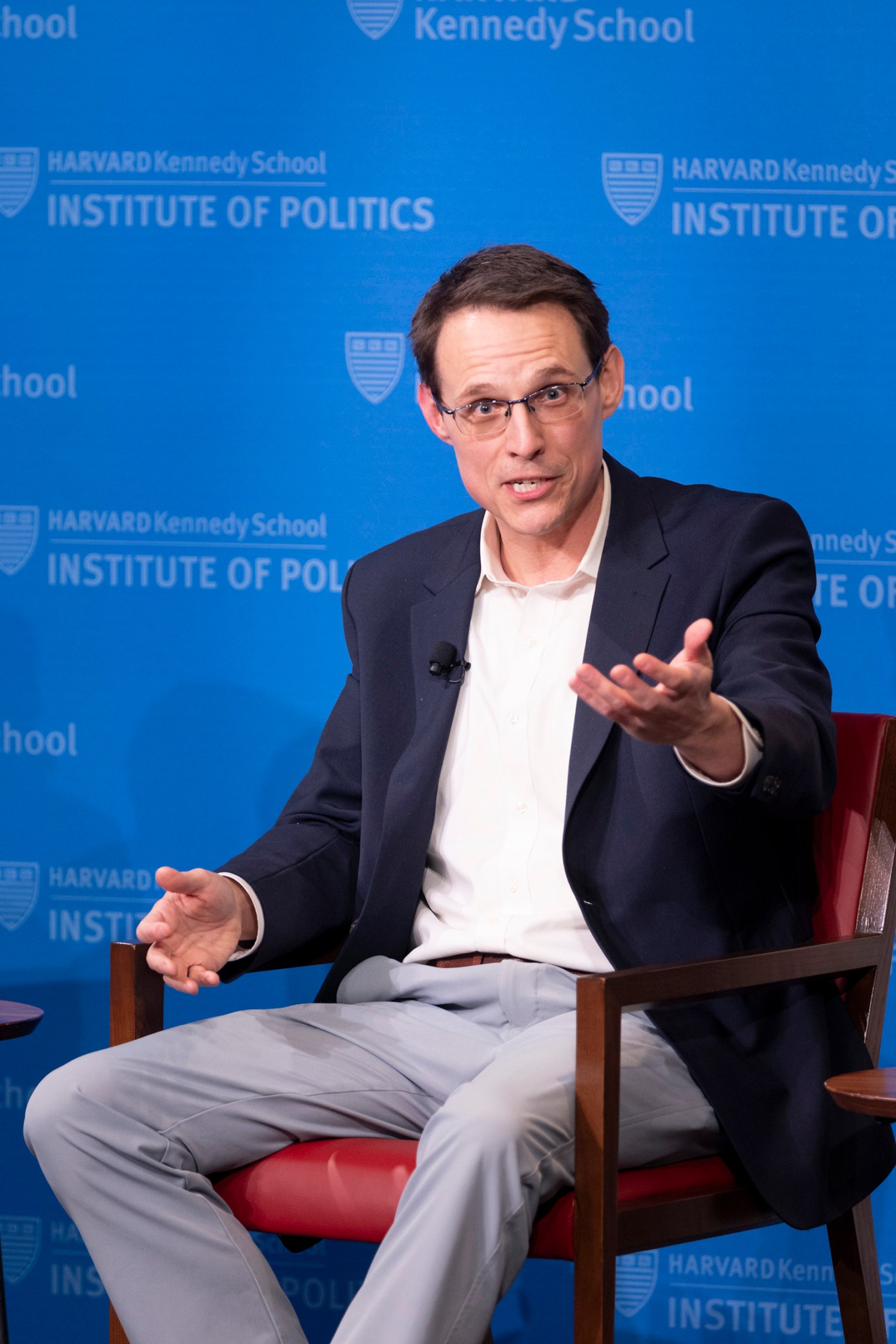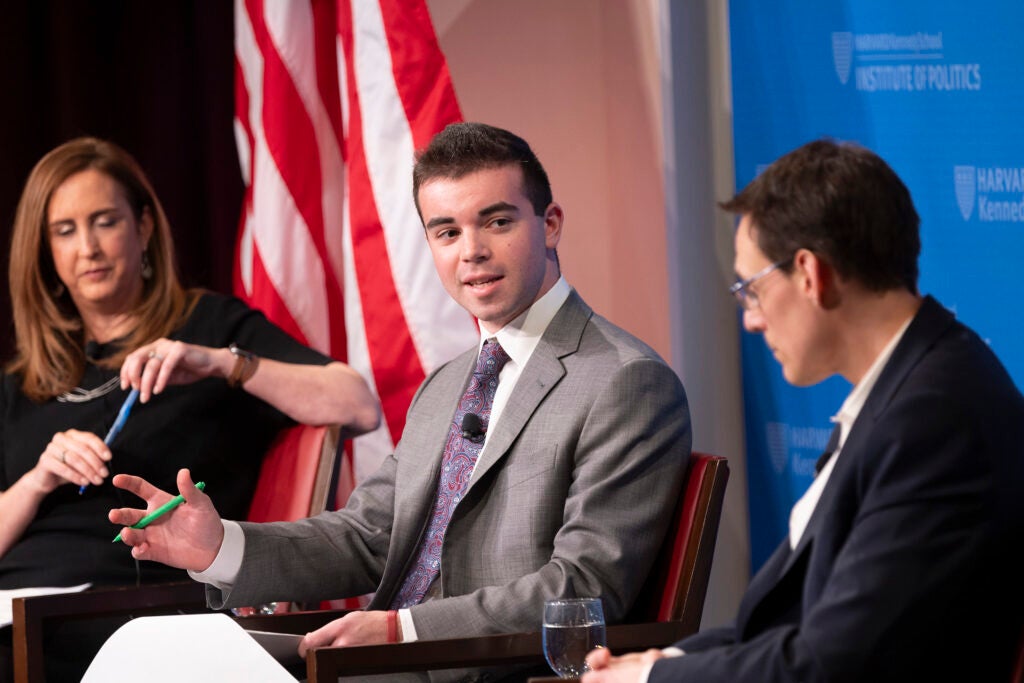Reading tea leaves with Steve Kornacki
NBC, MSNBC analyst sees Democratic potential, but lots of slack, uncertainty ahead for both parties

NBC News political correspondent Steve Kornacki.
Photos by Niles Singer/Harvard Staff Photographer
It was Valentine’s Day, a time for flowers and chocolate, but Steve Kornacki was more interested in tea leaves. Reading them, that is.
The NBC News and MSNBC political data analyst saw something in the recent special election held in New York in which the empty House seat of former Republican U.S. Rep. George Santos was flipped blue with the victory of Tom Suozzi.
“The red wave that many expected to hit the country in 2022 did not, [but] it did hit Long Island … [so] it is significant that Democrats took the [Santos] district and swung it back as much as they did,” Kornacki said. One data point hinting at potential Democratic power at the polls with the presidential elections nine months away.
Kornacki, who became an on-air and social media sensation during the 2020 election, took the stage at a recent John F. Kennedy Jr. Forum to share presidential race observations and discuss what candidates need to do to win. He was joined by Emmy-winning journalist and former executive producer of “Meet the Press” Betsy Fischer Martin, along with Harvard College student Jack Silvers ’25.
“Democrats, in terms of their turnout [in recent elections], have been off the charts relative to the Republicans,” he said. “Whether that makes any difference in November is the open question.”
“Democrats, in terms of their turnout [in recent elections], have been off the charts relative to the Republicans. Whether that makes any difference in November is the open question.”
Steve Kornacki
There are a lot of factors up in the air that could sway results. Looking more closely at the New York special election, Kornacki said Democratic turnout was high among the more affluent, college-educated, white residents of Nassau County. Queens County, which is less-well-educated and more racially and economically diverse, had a much lower turnout.
This was particularly true of young, non-white voters, mirroring national trends. It leads to a segment of the Democratic Party being “on fire,” and the other showing a lot of “slack” that could prove consequential come voting day.
What’s leading to some of this uncertainty? A lot of things, Kornacki said.
Among them are the possible effects of other, younger candidates beyond the presumptive Democratic and Republican front-runners, either of whom would be the oldest person to ever occupy the Oval Office at the end of the next term.

There’s the wild card of Nikki Haley, who continues to struggle along as the alternative — and highly unlikely to win — Republican nominee. There’s also some appetite for a third-party candidate, with Cornel West and Robert F. Kennedy Jr. still in the running — also considered unlikely to win, but still interesting, Kornacki said.
Then there are the criminal cases against Donald Trump. Polling suggests that if he is convicted, his appeal could drop significantly.
Also, few voters seem to be genuinely excited, and this lack of engagement could result in low voter turnout. With all these factors at play, a lot of political analysis comes down to “reading the tea leaves,” Kornacki said.
That means scrutinizing polling data. Kornacki reminded the audience of some of the challenges of relying on that. One of the reasons election outcomes are difficult to predict is because polling data can change drastically day to day. When polled, people share what they think they would do in a hypothetical situation, and that doesn’t always line up with their actual actions.
For example, data guru Kornacki said, look at what happened with former President Bill Clinton during his second term in 1998. When polls asked voters what they would do if he was found guilty of lying under oath about his sexual relationship with a White House intern, a majority in some surveys said he should be impeached or resign. The election took place amid the congressional inquiry, but that seemed to have little impact on Democratic election prospects as the party registered strong midterm results.
“I think what happens in these questions is a lot of people think there is a right answer when they are polled about it. What actually happens is their feelings are more complicated,” Kornacki said.
This has happened repeatedly with Trump. His numbers would temporarily drop and then bounce back to where they were before.
“Every single time he has traversed a line that was supposedly something you cannot cross in politics, he seems to pay an immediate political price and it reverts to the mean,” Kornacki said.
At the end of the event, Kornacki responded to a few lighthearted, rapid-fire questions. He laughed when asked whether his fashion go-to, Gap khaki pants, which went viral during the 2020 election, would be making a return. He admitted they were more the result of laziness than a run at being an influencer.
How will he fuel his late night election coverage? An extra-large coffee with extra milk from Dunkin’.
When asked earlier who he thinks will win in November:“We’ll know the day after the election,” he said.




